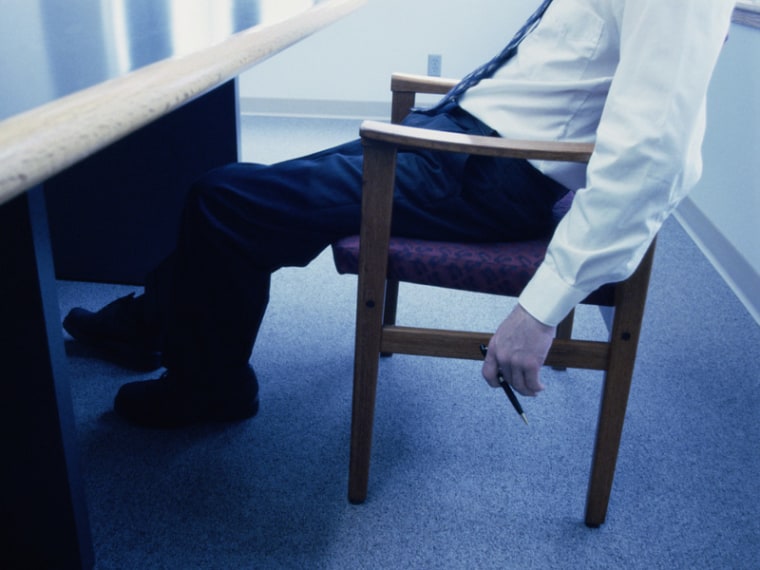By Keely Savoie, Prevention
Sure, bad posture can make you neck creak and your shoulders ache, but recent research shows that your slouch might be making you a grouch. Heads-up! Here are some weird ways posture can affect you—and how you can get out of the slump.
1. Deepens depression
In a recent study from San Francisco State University, students were told to either walk down a hall in a slouched position or to skip. The slouchers reported increased feelings of depression and lower energy than skippers.
That’s no surprise to posture expert Carol Krucoff, a yoga teacher and author of Healing Yoga for Neck and Shoulder Pain and founder of healingmoves.com. “Even our language reflects this connection between proper posture and emotional affect—someone weak is called spineless and someone proud has backbone,” she says.
The fix: Imagine there’s a headlight right in the middle of your chest at the sternum (breast bone), says Krucoff. Sitting or standing, your headlight should always shine forward. Now, keeping your head centered over your shoulders, extend your head toward the ceiling without lifting your chin.
2. Causes career problems
Slouching doesn’t just hurt your attitude—it can affect how people see you. “You don’t want to walk into somebody’s office slouching and bent over, because people really do perceive you as not as vital,” says Janice Novak, author of Posture, Get it Straight and director of improveyourposture.com. “To improve posture long term, you need to strengthen muscles mid-back,” she says.
The fix: To avoid being a slouch on the job, Novak recommends doing this exercise at your desk: Lift the bottom of your ribcage an inch or two off your hipbone, pulling your shoulder blades back and down. To make sure you maintain the position, pin a ribbon to top and to bottom of your shirt and keep it taut for 10 minutes at a time.
4 Ways Body Language Can Hurt Your Career
3. Backs you up
“When you sit in a crunched position, your viscera (intestines) are folded up, too,” says Steven Weiniger, author of Stand Taller, Live Longer and founder of BodyZone.com, which integrates chiropractic, exercise, massage and other therapies that promote healthy posture. “That can slow everything down.”
The fix: Yoga and pilates are great exercises to strengthen your core and help get things moving, says Weiniger. One pose that can rev up a sluggish gut is the Cobra: Lie on your belly while resting your head on your lower arms. Raise your forehead and look upwards, letting your weight rest on your chest. Letting your head fall back a little, move your belly further off the mat as if someone is pulling your arms.
4. Increases risk of death and disease
A recent Australian study found that after the age of 25, every single hour of television—i.e., slouching on the couch—reduced the viewer’s life expectancy by 21.8 minutes. Plus, when English researchers cross-referenced sitting time with health outcomes in a different study, they found that those people who sat the most more than doubled their risk of developing diabetes and had a 147 % increase in their risk for cardiovascular disease, even if they exercised.
The fix: Don’t let the box beat you. Novak suggests doing the TV Stand: Stand up from chair without using arms and sit down in a smooth and controlled motion. “Just doing this simple move can keep your lower body muscles very strong,” says Novak. (Stuck sitting at work? Here’s how to build your own standing desk.)
5. Makes you look heavier
Does this chair make me look fat? Well, yes, says Novak. “We’ve become a nation of professional sitters,” she says. “But when you are slouched over, your internal organs have nowhere to go but down and out—you immediately look fatter.”
The fix: The solution for this one is simple. “Get up and move,” says Novak. “When we stand as opposed to sit, we burn 20% more calories and strengthen our muscles, boost metabolism and increase bone density.” (Check out these easy ways to move more at work.)
6. Cuts off your circulation
“Our bodies are machines that move fluid and gases back and forth,” says Weiniger. Prolonged sitting, especially with your legs crossed, can cut off the flow, increase pressure and even cause spider veins.
The fix: To get blood flowing to your lower body, Weiniger says to stand up and find your best posture (these six tips can help you figure it out), then lift one leg up so your thigh is horizontal to ground. Keep your standing leg locked (not hyperextended) and hold for five strong breaths, pushing your breathing down to your diaphragm. Repeat on the opposite side.
7. Stresses you out
A recent study from Harvard showed that when people who adopted powerful postures (open shoulders and straight spines) had a 20 percent increase in testosterone levels and a 25% decrease in cortisol levels—but people who slouched had a 10% decrease in testosterone and a 15% increase in cortisol. That translates into low self-confidence and high stress. And sitting slouched over can compound the problem, says Krucoff. “Shallow chest breathing strains the lungs, which must move faster to ensure adequate oxygen flow, and taxes the heart, which is forced to speed up to provide enough blood for oxygen transport. The result is a vicious cycle, where stress prompts shallow breathing, which in turn creates more stress,” she says.
The fix: Krucoff suggests taking everyday cues—a ringing phone, a stoplight—as reminders to take relaxed abdominal breaths to combat stress. Here’s how to make sure you’re breathing deeply: Rest your hand below your belly button; you should feel your belly expand as you inhale. “Invite the air all the way down to the deepest portion of the lungs, where oxygen exchange is most efficient,” says Krucoff. As you exhale, you should feel your belly contract again and stress leave your body.
6 Weird Signs You’re Way Too Stressed
More from Prevention:
